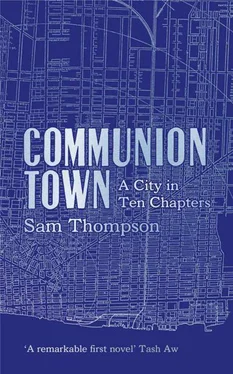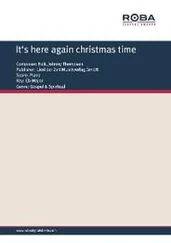‘When I am gone, Cassandra, it will be for you to carry on my work,’ he said. ‘We have a number of intriguing investigations in progress.’
He was looking at me strangely.
‘It would be a matter for regret, for instance, if the case of the Apples of Madness were not brought to a satisfactory conclusion, or the affair of the Chanting Leopard.’
‘But you’ll solve those cases yourself, Dr Fetch,’ I said, faltering. ‘You’ll outwit Lazarus Glass, I’m sure of it.’
‘Well, perhaps I shall, at that,’ he said. ‘It is in any case a nice knot, this business with poor Lazarus, not without certain points of interest.’
As I followed him down the staircase to the street, he added:
‘We were friends, once, long ago, Lazarus and I.’
In Professor Hyperion Weill’s study, the gloom was relieved only by the glow from a tasselled lampshade which hung, askew, next to what was left of the wingback chair in which the professor had been seated in his final moments. Bookshelves lined the walls, the floor was thick with rugs, and around us crowded keepsakes enough to fill a museum of criminology: pistols, blowpipes, jezail rifles and blackened daggers, chinoiserie caskets, bottles of chemicals, specimen jars in which pale forms floated, a human skull wearing a tiara of paste diamonds. The inspector assured us that nothing had been moved since the discovery of the scene by a porter investigating reports of an isolated nocturnal shriek.
The curtains were open, and through the windows I made out the branches of oak trees printed black against the night sky. Hyperion Weill had been a tall old man, and his arms and legs, broomstick-thin inside their sheaths of tweed, overhung the sides of the chair. The book lying open in his lap was glistening and darkly sodden. Evidently, no attempt had been made to free the corpse from the position in which it had been left.
I felt a shiver of outrage at this ugly end to so honourable a career. Hyperion Weill had been peerless among the investigators of his generation, but in due course he had retired from full-time detection to take up a post as Professor of Ratiocination at the university. That should have meant well-deserved years of reflection, writing and passing on the fruits of his experience to the respectful young — not this night of butchery.
Peregrine gazed at the scene for a long time, his features neutral.
‘Perhaps I should not have drawn him back into active investigation. But he knew our enemy well. He shaped both of us, Lazarus and me. We were so determined to impress him.’
As he scrutinised the object comprised of the remains of the professor and those of his favourite chair, Peregrine spoke in an undertone. Many years ago, he explained, he and Glass had studied together under the tuition of Hyperion Weill.
Callow as they had been in those days, young Peregrine Fetch and young Lazarus Glass were each intent, already, on surpassing even their teacher and becoming the single greatest detective the city had ever seen. In talent and ambition there had been little to distinguish the two youths, and for a time they had been as close as only devoted rivals can be. Only later had Lazarus chosen a different path.
Peregrine fell silent for a minute. I heard a droplet hit the floor beneath dangling fingertips.
‘I remember one of the earliest tutorials we had with him,’ he went on. ‘Lazarus had written an essay proposing an entirely new interpretation of one of Professor Weill’s own classic investigations: the case of the Nine Surgeons, if memory serves. The essay was a remarkable piece of work for an undergraduate, bold and original, and, as he read it aloud before the attentively bowed cranium of our tutor, Lazarus trembled with delight at the unfurling of his analytical faculties, at the excitement of elucidating through sheer deductive prowess aspects of the case which even the great detective himself had not previously understood.
‘Unfortunately, the argument was flawed. It was a small oversight, but crucial: if you recall, the Nine Surgeons affair involved a number of deadly weapons, and Lazarus’s interpretation was founded on a failure to distinguish between the types of wound that may be inflicted by a duelling rapier, a tachi sword and a cavalry sabre.’
Inspector Nimrod, standing back in the shadows of the study, muttered a heartfelt oath.
‘When Lazarus’s essay had reached its ringing conclusion, Professor Weill pointed out this simple error and methodically dismantled the entire deductive edifice constructed upon it. Lazarus received the lesson badly. I believed at the time that it took him an entire term to shake off his mortification.’
Peregrine, who was now squatting very close to the object of his inspection, looked up at me.
‘It appears, however, that he may have nursed the resentment for longer.’
He indicated the three dissimilar sword-hilts protruding from the chest of the corpse of Hyperion Weill, their steel blades crossed at the point where they emerged through the back of the chair.
‘These are, I notice, the very implements which formed the crux of Lazarus’s early academic misstep. Our killer entered Professor Weill’s study and perhaps engaged him in conversation. Then he snatched the first of these weapons from where it hung on the wall among the mementos of the professor’s long career — note the three sword-shaped patches of unfaded wallpaper — and, with it, struck the first blow. The others followed, rapier and tachi , as if in excess of revenge for that distant humbling. As if to impart his own lesson in the varieties of possible harm.’
Peregrine looked into his old tutor’s face, which was not peaceful.
‘We begin to perceive the contours of a dreadful logic. Those who have thwarted Lazarus Glass would do well to beware tonight.’
The gothic apartment blocks of Juno Square showed a handful of lit windows, but the streets were empty as we followed Inspector Nimrod through Belltown. Few had business in the university district at this time of night. Black reflections slicked ahead of us in the pavements and great weeping globes clung about the head of each lamp post.
Of those who had studied the arts of detection under Hyperion Weill, the most promising of all had been Electra Cavendish-Peake. She was a few years older than Peregrine and Lazarus, and the two friends had in their early days regarded her with envy and awe. She appeared far closer to the mastery they desired, with her sharp scholarly manners and hermetic turn of mind, her knowledge of esoteric casebooks and the furthest reaches of ratiocinatory theory, and the chilly style in which, while still a graduate student, she had solved the case of the Liars’ League: it had been as if she fixed that conspiracy in a block of ice which, with one smart tap of the intellect, she shattered, breaching all its secrets.
But she had shown small inclination to pursue the life of investigative adventure which beckoned. She preferred more regular habits, haunting the reading rooms of the university and city libraries, spending part of each afternoon at her club, and dining each evening at the same bistro, alone, with a book of abstruse criminology propped open before her. She devoted herself to research and correspondence, very occasionally publishing a monograph putting forward some revision to the fundamental theoretical postulates of detection, or an article resolving beyond question a cold case which had stumped the best minds of a century ago. The previous year, when after months of inquiry Peregrine had been all but ready to admit defeat in the matter of the Doubting Child, Electra had provided the key to the problem in a two-minute telephone conversation.
Peregrine had recounted this much by the time we arrived at a restaurant with a handwritten menu tacked inside its grubby window. A pair of police uniforms moved aside to admit us, and we found ourselves among a jumble of tables on which suppers lay half-finished. Wine from overturned carafes had stained the checked tablecloths deep red. In the far corner of the room, the body of Electra Cavendish-Peake leant across the table at which she had begun, but not concluded, her last meal.
Читать дальше
Конец ознакомительного отрывка
Купить книгу












